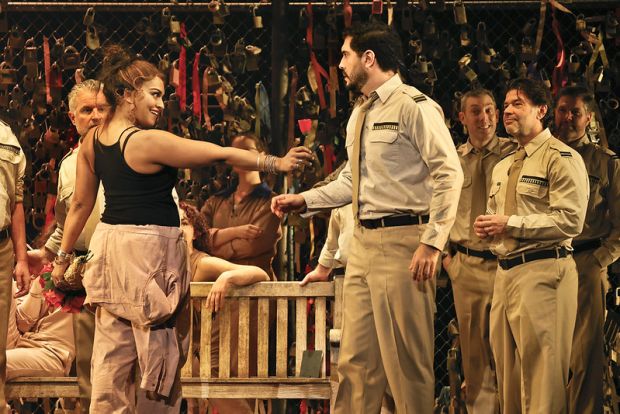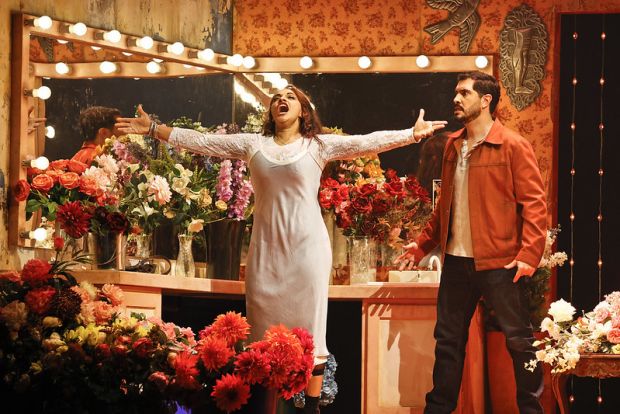Carmen
Carmen is an opera that provides highly recognisable music having infiltrated its way into popular culture and the popular psyche. The story is extremely colourful, highly dramatic and the music emphatically accentuates these aspects. This production is clearly inspired by the strong emotions the opera elicits, and the overall vision and design of this production is extremely willing to emphasise these aspects. No character or context is trivialised, and the contemporary setting reinforces the relevance of the bigoted and discriminatory gender dynamics that feature in the story.

The setting of this production of Carmen conjures liminal spaces such as areas that resemble refugee camps or the gaudy tavern where the gang of smugglers engage in the revelling with Carmen and her friends from the cigarette factory. The prevalence of flamboyant religious symbols and paraphernalia gives the setting a sardonic edge, highlighting the double standards and societal hypocrisy. The glaring nature of light in all of the locations and the use of intense reds in both décor and lighting creates a laser focus on the sense of doom that characterises this opera. The set and costume design (Marg Horwell) combined with lighting design (Paul Jackson) seem to deliberately insist on bordering on tastelessness and this creates a very harsh and troubling ambience.

Soprano, Danielle de Niese, embodies Carmen beautifully. She makes her feisty and fickle but above all principled in relation to her sense of freedom both politically and personally. Her ability to choose where her affections will be directed and the right to explore them in a flirtatious, flippant or serious manner renders her sexual liberation a key feature of her persona.
Tenor Abraham Bretónc creates a very feeble-minded Don José who is frequently at the mercy of the women in his life. He seems to lack any sense of will of his own with his mother, his fiancé Micaëla (Jennifer Black) and Carmen as his lover. While he is supported by a patriarchal and religious system that believes in an innate possession of women, he struggles to inhabit any real position of authority and this works well to explain or contextualise the events that lead to the violent ending.

The singing is outstanding and extremely rousing, especially when the generous cast fill the stage and sing in chorus. This numerous cast adds to the business, chaos and unpredictability of the narrative and makes the production very impressive. Orchestra Victoria is exquisite and precise in its vibrant approach to bringing the highly identifiable music to life. The execution draws out both the explosive and seductive nature of the music.
Opera fans will easily appreciate the fresh perspective and unexpected vision that Sarks brings to the opera which fully exploits and indulges its fundamentally enormous theatricality.
Patricia Di Risio
Photographer: Jeff Busby
Subscribe to our E-Newsletter, buy our latest print edition or find a Performing Arts book at Book Nook.

